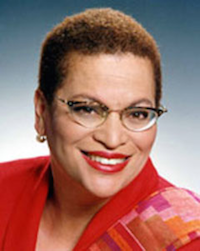June 19, 2015

Julianne Malveaux, NNPA Columnist
The unemployment rate rose just a bit in May, an indicator that Wall Street and Main Street are celebrating because that means more people are looking for work and that more people are optimistic. Some polling data says something quite different – two major media polls show widespread dissatisfaction with the status quo, with majority support for an increased minimum wage, for paid parental leave and paid sick leave. Further, more than 60 percent said there was room for advancement in our economy.
An analysis of the New York Times/CBS poll concludes, “inequality looms large” in the minds of most Democrats and independents, and nearly half of all Republicans. These are the folks who are reading the headlines that say things are getting better, and living a life that say things are too slow and too stagnant for them.
The disconnect partly reflects the difference between productivity increases and GDP increases. In other words, people are working harder, and national productivity is growing faster, than wages are. Last month, the average hourly worker earned about 8 cents more than they did the month before. Those eight cents represent a 2.3 percent increase this year. This sounds like good news this year, but what about stuck wages for the past several years? Those who are reading about good news are asking, “What about me?”
The latest unemployment report sends a similar mixed message. While the unemployment rate ticked up from 5.4 percent to 5.5 percent, the good news is that 280,000 new jobs were created in May 2015. That’s great news and on target for the number of jobs that need to be created to bring us back to the employment levels we enjoyed eight years ago. Not so good news: Many of these jobs aren’t “good jobs.” Nearly half of the jobs in “business services” are part-time or consulting jobs. These are jobs that offer no health insurance, no sick days, no paid vacation. These are folks who, even when highly compensated, are on their own.
Perhaps the increase in leisure and hospitality employment reflects optimism about the economy, because it suggests that employers think more people will be traveling and enjoying hospitality services this summer. Still, most of the jobs in this industry are part-time, with the average worker getting 22 hours a week— too few to qualify for benefits.
In hospitality, including food and drinking places, young people are working for low wages, often depending on tips, always earning less than they might if the labor market would absorb them at their skill level. Meanwhile, many of us who enjoy the services of the coffee barista, the waitress, or the theme park guide don’t ever wonder how well they are paid.
Still, it makes sense to revel in the good news – the unemployment rate is lower than it was a year ago. Always, though, there are the footnotes. The 5.5 percent unemployment rate is 10.8 percent when indices of labor utilization are considered. The African American unemployment rate, at 10.2 percent, is nearly 20 percent when underutilization measures are considered. The 20 percent rate lower than a year ago, but it is still too high.
The percentage of the population that is employed also reflects significant racial gaps. While nearly 70 percent of White men are working, just 62 percent of Black men have jobs. And while the same percentage of White women and Black women hold jobs, given data on men, it is clear that African American women are responsible for much more of the family income than Caucasian women are.
No wonder people who hear about ‘good news’ don’t feel it. No wonder they are responding to polls with a concern that does not reflect the so-called good news. No wonder too many are concerned about poor working conditions, about feeling that they have no opportunity to improve their situation, about being frightened by the income inequality that will determine the futures of their children.
Are we excited about the news that the economy is recovering? Of course. Some of us would be much more excited if the recovery trickled down.
Julianne Malveaux is a Washington, D.C.-based author and economist. She can be reached at www.juliannemalveaux.com.

